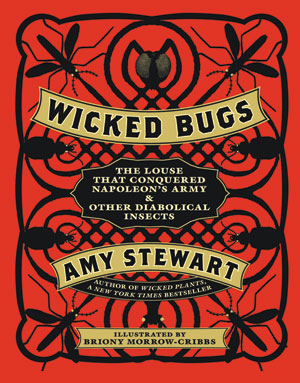BY AMY STEWART

You are much smarter than the ants, spiders and beetles that live and lurk near your house. You’re way bigger than they are, and bigger means stronger, right? If only that were true – in Amy Stewart’s book “Wicked Bugs,” we learn how insects have changed the course of history.
“[Insects] have halted soldiers in their tracks. They have driven farmers off their land. They have devoured cities and forests, and inflicted pain, suffering and death upon hundreds of millions,” Stewart says.
Take, for instance, bees, hornets and wasps. Getting stung is an annoyance (at best) and a life-or-death matter (at worst), so imagine dealing with an entire nest of ticked-off stingers flying over your head, courtesy of enemy catapults. Or imagine the buzz you’d get when downing “hornet juice,” an amino acid sports drink that mimics the aggression of the insects.
Did you know that a relentless hoard of black flies can kill a large animal in a couple of hours and persistent mosquitoes could drain half your blood faster than that!
On the other hand, creatures with more than four legs can be benign. Parasitic wasps munch on tomato hornworms. Spiders eat filthy, germ-spreading houseflies and ladybugs will dine on aphids if you invite them into your garden.
Are you a catch-and-release-the-spider kind of person? Or do you suffer from Dead Insect Syndrome (in which you “respond to insects almost automatically by killing them.”)? Either way, you should fly to this book.
Author Amy Stewart gleefully makes readers shiver and scratch as she teaches us about biting spiders, hanging centipedes, egg-laying flies and other bad-boy bugs. You’ll learn about the hot fad of beetle collecting in Darwin’s time and how termites played a role in the damage of Hurricane Katrina.
This book may make you shudder, but you’ll definitely be fascinated. “Wicked Bugs” is, in fact, perfect for gardeners, nature-lovers, and worms of the bookish sort.






